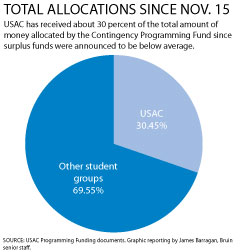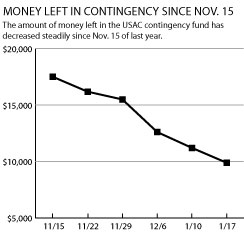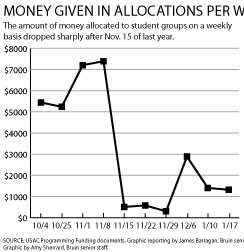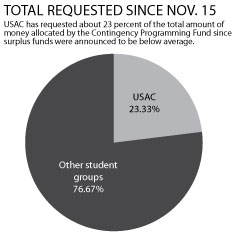


Undergraduate student government leaders continue to apply for and receive funding for student programs, despite the fund’s dwindling cash resources.
Late fall quarter, the Undergraduate Students Association Council found out their leftover funds, which the council has used to supplement student programming, were lower than expected. The council enacted a 50 percent reduction to weekly student programming allocations at its meeting on Nov. 15.
Ronald Arruejo, the chair of USAC’s finance committee, said student groups should not expect the same amount of money as they have received in previous years, but council members have continued to apply for and receive these funds.
Since Nov. 15, council members have asked for about 23 percent of the total money requested from the fund. They have received 30 percent of the allocations given from the fund, according to weekly contingency allocation documents.
USAC offices are considered student groups and are eligible for this funding.
“It is our job to provide for the entire student body,” said Jamie Yao, Community Service commissioner. “To do that, we do need some funding to provide some services and programs for students.”
On Nov. 15, $170 from a total of $508 were allocated to USAC offices. This money helped fund the Student Welfare Commission’s Thanksgiving potluck and a Stress Free Day, an event to help students become aware of academic and well-being resources on campus. The latter event was put on by the Academic Affairs commissioner and the General Representative 2’s office.
Thirty-three percent of a total of $3,047.81 was allocated to USAC offices on Dec. 6. This money helped fund a welcome back event, a nutritional fair and retreats for three USAC offices.
General Representative David Bocarsly, who used the money to pay for food and facilities for his office’s retreat, said his office planned its retreat several months in advance.
“Retreats are necessary to move the office forward,” Bocarsly said. “It helps the office’s cohesiveness and helps us advance projects.”
Bocarsly added that the USAC offices received the same 50 percent reduction in allocations as other student groups.
Student government groups tend to take precedence over other groups when it comes to funding, said Joshua Huang, a second-year mathematics/economics student and a staff member in the Chinese Student Association.
“Since they are the student government, they do have higher priority,” Huang said. “But it would be nice if (student groups) had more access to it, too.”
Some USAC offices have decreased the amount of money they apply for, Arruejo said. Most offices with their own funds are digging into their own budgets, he said.
Other offices have their own sources of funding, Arruejo said. A referendum passed by students allows these offices to put on large-scale programs, he added.
These offices include the Campus Events Commission, Cultural Affairs Commission, Student Welfare Commission, the External Vice President, Academic Affairs Commission and Community Service Commission, Arruejo said.
But these offices are limited in where they can spend their own funds, Arruejo said.
As a result, some of these offices have continued to apply for contingency funding for things such as food for members. The contingency fund is the only source for student groups to get funding for food, Arruejo said.
The Academic Affairs Commission only applied for funding for food and location for its winter retreat, said Raquel Saxe, Academic Affairs commissioner.
“(USAC officers) should be the example of relying less on these sources less,” Saxe said. “As student leaders who help others, we shouldn’t be further burdening these sources.”
Saxe said she told her office to cut down on costs and try to find more creative funding sources.
The reduction in weekly allocations that has affected student groups has also impacted USAC offices. Because it could not get all the speakers they wanted, Saxe’s office decided not to go through with an event it had planned.
In the end, the office decided not to apply for funding at all, Saxe said.
“We didn’t want to be wasting money on something that isn’t the best that it could be,” she said.
Anh Nguyen a second-year undeclared student and a staff member in the Vietnamese Student Union, said she is fine with USAC using some of the funds as long as it is used for relevant events.
“If they are using it to develop better leaders to help others, then I feel like it makes sense because it trickles down,” Nguyen said.
Bocarsly said USAC is trying to advocate for more money for groups not affiliated with student government, as the council recently requested $100,000 from Associated Students UCLA.
